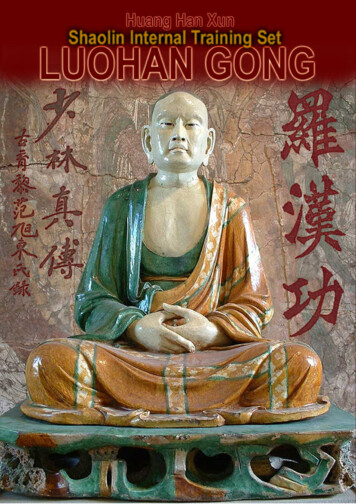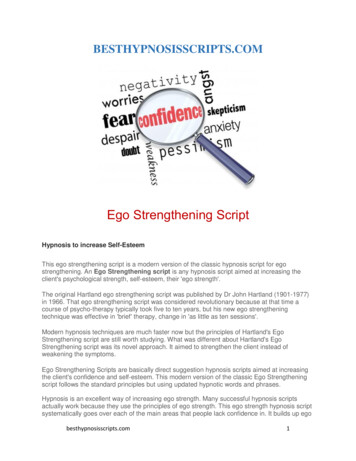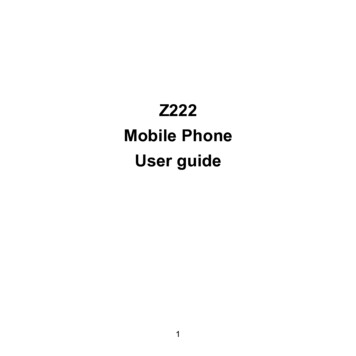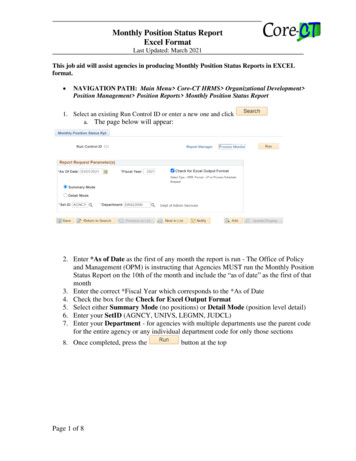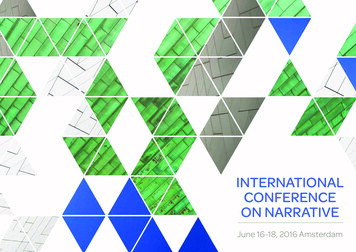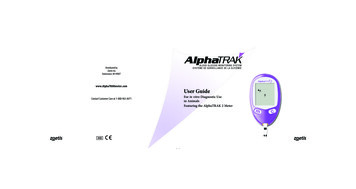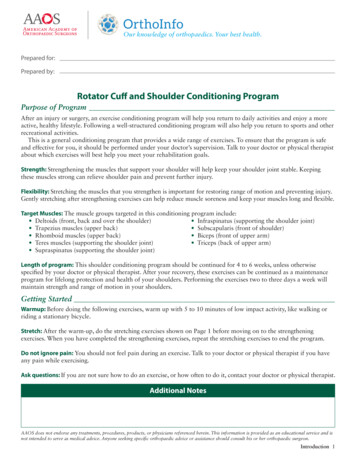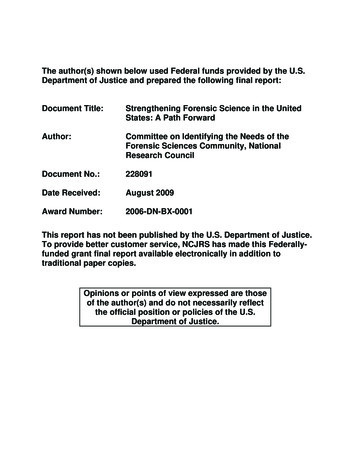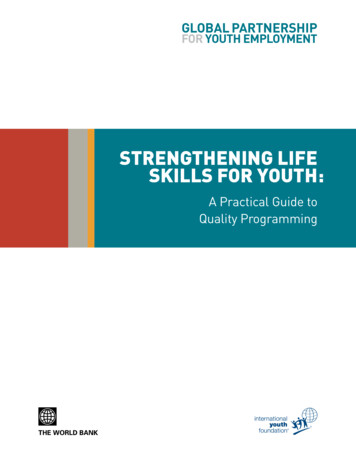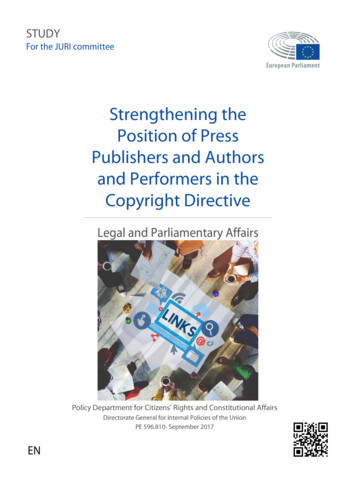
Transcription
STUDYFor the JURI committeeStrengthening thePosition of PressPublishers and Authorsand Performers in theCopyright DirectiveLegal and Parliamentary AffairsPolicy Department for Citizens' Rights and Constitutional AffairsDirectorate General for Internal Policies of the UnionPE 596.810- September 2017EN
DIRECTORATE GENERAL FOR INTERNAL POLICIESPOLICY DEPARTMENT FOR CITIZENS' RIGHTS ANDCONSTITUTIONAL AFFAIRSLEGAL AND PARLIAMENTARY AFFAIRSStrengthening the Position ofPress Publishers and Authors andPerformers in the Copyright DirectiveSTUDYAbstractThis study was commissioned by the European Parliament’s Policy Department forCitizens’ Rights and Constitutional Affairs at the request of the JURI committee.It reviews Art 11 and Arts 14-16 of the proposed Directive on Copyright in theDigital Single Market. It outlines criticisms that have been made of the proposals,includes reports of research into the operation and effects of precursors of Article11 in Germany and Spain, a summary of the cultural economics literature on legalregulation of authors’ contracts and analysis of the laws of 7 Member States tosee in what way Arts 14-16 would “add value”.PE 596.810EN
ABOUT THE PUBLICATIONThis research paper was requested by the European Parliament's Committee on Legal Affairsand commissioned, overseen and published by the Policy Department for Citizens’ Rights andConstitutional Affairs.Policy departments provide independent expertise, both in-house and externally, to supportEuropean Parliament committees and other parliamentary bodies in shaping legislation andexercising democratic scrutiny over EU external and internal policies.To contact the Policy Department for Citizens’ Rights and Constitutional Affairs. or tosubscribe to its newsletter please write to:poldep-citizens@europarl.europa.euRESPONSIBLE ADMINISTRATORDr.Udo BuxPolicy Department for Citizens' Rights and Constitutional AffairsEuropean ParliamentB-1047 BrusselsE-mail: poldep-citizens@ep.europa.euAUTHORSLionel Bently, Professor at Cambridge University, Co-Director of CIPILMartin Kretschmer, Professor at Glasgow University, Director of CREATe CentreTobias Dudenbostel, Consultant at Technopolis Group AustriaMaría del Carmen Calatrava Moreno, Consultant at Technopolis Group AustriaAlfred Radauer, Senior Consultant at Technopolis Group AustriaEDITORIAL ASSISTANTMonika Laura LAZARUKLINGUISTIC VERSIONSOriginal: ENDISCLAIMERThe opinions expressed in this document are the sole responsibility of the author and do notnecessarily represent the official position of the European Parliament.Reproduction and translation for non-commercial purposes are authorised, provided thesource is acknowledged and the publisher is given prior notice and sent a copy.
CONTENTSContents3LIST OF ABBREVIATIONS5LIST OF TABLES7Executive SUMMARY81. Introduction102. The Proposed Directive on Copyright in the Digital Single Market113. The Proposed Press Publishers Right (Art 11)133.1. Background133.2. Controversy in outline173.3. European Parliament Committee Amendments243.4. How is the System Operating in Germany and Spain?293.4.1.Findings303.4.2.Assessment of effects of the Publishers’ Right333.5. Appraisal373.5.1.Need and Proportionality373.5.2.Journals383.5.3.Digital or Print?383.5.4.Snippets and Hyperlinks393.6. Conclusions and Recommendations on Press Publishers Right4. Authors and Performers Contracts Provisions (Articles 14-16)42434.1. Background434.2. The Commission Proposal444.2.1.Art 14: Transparency Obligations454.2.2.Contractual Adjustment Mechanism – Article 15474.2.3.Alternative Dispute Resolution (ADR) – Art 16494.3. The Response504.3.1.The Legal Basis504.3.2.Lack of Ambition514.3.3.Creative Commons Criticism524.3.4.Labour Markets for Creators: A Cultural Economics Perspective534.4. Comparative Position on Author and Performer Contracts in ermany60
Policy Department for Citizens' Rights and Constitutional n694.4.7.United Kingdom704.4.8.Do the Proposals Add Value?714.5. European Parliament Committee Amendments724.6. Proposed Amendments in JURI774.7. Tentative Conclusions on Authors and Performers Contracts83References86Annex 1 Interview Protocols92Annex 2 Sample selection944
Strengthening the Position of Press Publishers and Authors and Performers in the Copyright DirectiveLIST OF ABBREVIATIONSADR Alternative Dispute ResolutionAEEPP Asociación Española de Editoriales de Publicaciones Periódicas(Spanish Association of Periodical Publications)AMEC International Association for the Measurement and Evaluation ofCommunicationCCIA Computer and Communications Industry AssociationCEDRO Centro Español de Derechos ReprográficosCEIPI Centre for International Intellectual Property Studies, Université deStrasbourgCIPIL Centre for Intellectual Property and Information Law, University ofCambridgeCREATe Centre for Copyright and New Business Models in the CreativeEconomy, University of GlasgowCoR Committee of the RegionsCRIDS Centre de Recherches en Information, Droit et Société (Universityof Namur)CULT Culture and Education CommitteeECOSOC Economic and Social CommitteeECS European Copyright SocietyEDIMA European Digital Media AssociationEMMA European Magazine Media AssociationENPA European Newspaper Publishers AssociationEPubC European Publishers CouncilEPolC European Policy Centre5
Policy Department for Citizens' Rights and Constitutional AffairsFEP Federation of European PublishersFIBEP Federation International des Bureaux des Extraits de PresseGAFA Google, Apple, Facebook, AmazonIGEL Initiative gegen Ein LeistungsschutzrechtIMCO Committee on the Internal Market and Consumer ProtectionITRE Committee on Industry, Research and EnergyIViR Institut voor InformatierechtJURI Committee on Legal affairsLIBE Committee on Civil Liberties, Justice and Home AffairsMPI Max Planck Institute for Innovation and Competition Law (Munich)NLA Newspaper Licensing Agency (UK)NME New Media EuropeOFE Open Forum EuropePA Publishers Association (UK)SOA Society of Authors6
Strengthening the Position of Press Publishers and Authors and Performers in the Copyright DirectiveLIST OF TABLESTable 1: Amendments by CommitteeTable 2: Recitals by Committee25767
Policy Department for Citizens' Rights and Constitutional AffairsEXECUTIVE SUMMARYWith a view to assisting the ongoing deliberations in the Committee on Legal Affairs, and theEuropean Parliament more generally, the Study considers two controversial initiativescontained in the European Commission’s proposed Directive on Copyright in the Digital SingleMarket (2016): the proposal for a press publishers’ right (Article 11); and the three draftarticles designed to improve the contractual position of authors (Article 14-16).The proposed right for press publishers (Article 11) has proved extremely controversial.Building on two recent experiments in Germany and Spain, the Commission has proposed aharmonized right for press publishers lasting 20 years. There has been considerable lobbyingfrom the press publishers and counter-lobbying from the representatives of the new digitalindustries.The proposed Directive contains three provisions on authors’ and performers’ contracts. Thefirst – the transparency provision (Article 14) – would require transferees of copyright toprovide authors with details of exploitation of their works, though would leave it to MemberStates to adapt the general obligation to the different needs of various sectors within thecopyright industries. The second – the ‘contract adjustment mechanism’ (Article 15) –would require Member States to empower authors to received ‘additional, appropriate’remuneration where they can show that the remuneration they receive is ‘disproportionatelylow’ compared with the revenue and benefits generated. The third – the alternative disputemechanism (Article 16) – requires Member States to make provision outside courts andtribunals for voluntary dispute resolution. These three provisions have proved lesscontroversial, but one major criticism has been that they are unduly modest.Rather than trying to mediate between these conflicting claims of lobbyists for or againstArticle 11, this report focuses on the academic criticisms and the empirical evidence relatingto the national precursors of the proposal. To do so, the Study sought out the latest viewsfrom journalists working on online editions of German and Spanish newspapers. The reportsets out the criticisms made of the proposal, and the results of interviews with operators inSpain and Germany. In the light of this, the report concludes that there are real concernssurrounding the rather uncertain effects of the right, and many of the problems facing presspublishers can be resolved by a much less controversial intervention. We therefore approvethe proposal made in the draft JURI Opinion, namely that the press publishers’ right beabandoned and replaced with a presumption that press publishers are entitled tocopyright/use rights in the contents of their publications.With respect to the proposals on the positions of authors and performers, we reviewed thelaws of seven Member States to see how far the proposed new articles would “add value,”as well as the literature from the field of cultural economics to help understand how likelythese interventions were to be helpful. We conclude that while the laws in many MemberStates go much further in their attempts to strengthen the weak bargaining position in whichmost authors and performers find themselves, nevertheless there is actually considerablevalue in what is being proposed by the Commission.However, we also note that the economics literature suggests that many of the (financial)problems that face authors relate to the structure of the markets, and will not easily berectified by legal intervention. While we are sympathetic to some of the additional proposalsmade in amendments from other Committees of the European Parliament, and indeed, thedraft JURI proposal for a generalised right to equitable remuneration, we think that8
Strengthening the Position of Press Publishers and Authors and Performers in the Copyright Directiveexperience in Member States means that much more thought should be given as to how thismight be introduced at EU level. We suggest this might best be achieved by signalling to theEuropean Commission that this should be a priority, rather than trying to introduce such apotentially disruptive proposal by amendment.9
Policy Department for Citizens' Rights and Constitutional Affairs1. INTRODUCTIONOn 10 May 2017, the consortium consisting of Technopolis Group and Cambridge University,Centre for Intellectual Property and Information Law (CIPIL) was invited to submit an offerfor a research paper on ‘Strengthening the position of press publishers and authors &performers in the copyright directive”.The desk work has been executed primarily by CIPIL, University of Cambridge, with asubcontract given to Prof. Martin Kretschmer from the University of Glasgow and Head of theCREATe Centre. Technopolis has been responsible for the empirical work.This report is divided in 4 chapters: Chapter 1:The introduction lays out the aim and structure of the study. Chapter 2:This sets the scene: the Commission Proposal of September 2016 fora Directive on Copyright in the Digital Single Market Chapter 3:Explains the background to the proposed Article 11, including theperceived problem, activities in two Member States (Germany and Spain), andexamines the proposal in detail. Chapter 4:Explains the Commission Proposals in Articles 14-16, outlines thecriticisms that have been made, and through comparative analysis examineswhether they will “add value” compared with national law. The chapter thenconsiders the proposed interventions from the perspective of cultural economics,before offering views on various possible amendments to the proposal.10
Strengthening the Position of Press Publishers and Authors and Performers in the Copyright Directive2. THE PROPOSED DIRECTIVE ON COPYRIGHT IN THEDIGITAL SINGLE MARKETOn September 14, 2016, the European Commission introduced a proposal for a Directive onCopyright in the Digital Single Market.1 The proposal was supported by an ExplanatoryMemorandum and three volumes of ‘Impact Assessment.’ 2The Proposal has now been considered: (i) By the European Economic and Social Committee, Jan 25, 2017;3 (ii) By the Committee of the Regions, February 8, 2017. The rapporteur was Mauro D'Attis(EPP/It);4 (iii) By the Committee on Culture and Education, which produced a draft Report onFebruary 6, 2017, and an Opinion on 14 July, 2017 (Rapporteur, Marc Joulaud (EPP/Fr).5 (iv) By the Internal Market and Consumer Protection Committee (IMCO), June 14, 2017.The rapporteur was Catherine Stihler (S&D/UK).6 (v) By the Committee on Civil Liberties, Justice and Home affairs (LIBE (rapporteur MichałBoni (EPP/Pol). A draft report was issued on May 22, 2017. Its proceedings are limited toArticle 13 of the proposed Directive. (vi) By the Committee on Industry, Research and Energy (ITRE) on July 12, 2017. 7 Therapporteur was Professor Zdzisław Krasnodębski (ECR/Pol). (vii) By the Legal Affairs Committee, which produced a draft report on March 8, 2017.The rapporteur was Therese Comodini Cachia (EPP/Malta). As far as we are aware 996amendments to the Commission proposal have been tabled. As Therese Comodini Cachialeft the European Parliament in order to take up a seat in the Maltese Parliament, AlexVoss (EPP/Ger) has been appointed as rapporteur for the final report.Amongst the many reforms, two of the most controversial are Article 11, introducing a presspublishers’ right, and Articles 14-16, which deal with regulation of contracts betweenauthors/performers and licensees and transferees who exploit their works/performances.Both sets of provisions are situated in Part 4, on ‘measures to achieve a well-functioningmarketplace for copyright.’The two sets of provisions are attempts to respond to two distinct problems, though they areboth underpinned, first, by a commitment to the view that copyright is a tool to sustain theavailability of a plurality of voices, and, second, by a perception that market operations are(or are no longer) adequate to achieve this. Thus, news publishers are seen as vital todemocracy, but suffering under changes associated with digitisation, to an extent to whichpolicy-makers are concerned with the sustainability of these organs. Likewise, independentCOM(2016)593 final at http://eur-lex.europa.eu/legal-content/EN/TXT/?uri eu-copyright-rules3OJ C 125/27 (OJ April 21, 2017).4SEDEC-VI-019, 121st Plenary Session, 8-9 Feb, 2017; 2017/C207/14 in OJ C 207/80 (OJ, June 30, do?pubRef 2bDOC%2bPDF%2bV0%2f%2fEN6PE 599.682v02-00 on etDoc.do?pubRef 2bDOC%2bPDF%2bV0%2f%2fEN1211
Policy Department for Citizens' Rights and Constitutional Affairsauthors need to be able to make a living from the exploitation of their works if Europe is tomaintain a thriving culture and marketplace of ideas.Beyond this, however, the two problems are relatively distinct (and the proposals are,according to some commentators,8 in conflict in so far as the press publishers right wouldmake it more difficult for authors to exercise their rights). 9 It is therefore economical to treateach in turn.8 van Eechoud, M. (2017), A publisher’s intellectual property right: implications for freedom of expression, authorsand open content policies, Research paper for OpenForum Europe: rs-right FINAL.pdf, 37.9 Though note various proposals to amend proposed Art. 11 to create an obligation to pay fair remuneration tocontributors.12
Strengthening the Position of Press Publishers and Authors and Performers in the Copyright Directive3. THE PROPOSED PRESS PUBLISHERS RIGHT (ART 11)3.1.BackgroundAlthough print publishers have long been able to claim copyright indirectly from thecontributions of their journalists, historically, copyright has not been a key part of theirbusiness model.10 For sure, there has been a tradition of licensing so-called “cuttingsservices”, but these revenues have been minor compared with revenues from subscriptionsand sales and, especially, advertising.Digitisation has significantly affected this business model, but, in contrast to the ‘copyrightindustries’, such as the record industry, the threat to press publishers does not come fromdigital piracy or ‘peer to peer’ copying. Rather, it is changes in advertising practice associatedwith the Internet that have most dramatically affected print newspapers, as advertisers havereduced expenditure on print in favour of online advertising. In addition, newspapers havetried to move their outlets to the Internet, using different models (freemium, subscription,paywall, advertising) with inconsistent levels of success. 11 This has often brought with it adecline in print sales. Perhaps not surprisingly, declines in sales and declines in advertisingrevenue frequently mean declines in income and threaten the very existence of some papers.At the same time, we have seen the emergence of so-called ‘news aggregators’, Internetservices providing users with collection of links, and sometimes excerpts, from onlineversions of newspapers. Sometimes these aggregators appear to operate gratuitously, aswith Google’s GoogleNews service or the Squidapp; sometimes they are paid by clients toidentify stories reflecting the client’s specific interests (Meltwater, Ubermetrics or the smallentity CutBot.)12 Some publishers have responded to these practices by seeking to extractlicence fees, sometimes using litigation. Indeed, a case concerning the Danish operator‘Infopaq’ made its way twice to the CJEU.13 Such litigation has, however, not proveduniversally successful, though it has operated as an important backdrop to certain voluntaryinitiatives by Google.14It is in this environment that a number of Member states have sought to develop new rightsfor press publishers.In 2013, after 4 years of debate, Germany introduced the one-year neighbouring right forpress publishers covering the making available for commercial purposes of publications andfragments thereof (but not the smallest text excerpts). This is known as theLeistungsschutzrecht and is found in Sections 87f through 87h of the Copyright Act. Atranslation, by Ute Reusch, states:15Danbury, R, ‘Is Intervention Appropriate?’ Evaluating potential legal responses to threats to the production /working-papers11EC, Impact assessment, p 156, 160.12On Cut-Bot, see presentation of James McKenzie at CIPIL-IViR (2016).13Infopaq, Case C-508, ECLI:EU:C:2009:465 ; Case C-302/10, ECLI:EU:C:2012:16.14CEIPI, 6-7.15http://www.gesetze-im-internet.de/englisch urhg/englisch urhg.html#p06161013
Policy Department for Citizens' Rights and Constitutional AffairsThe German Neighbouring Right for Press PublishersSection 87fPublishers of newspapers and magazines(1) The producer of a press product (publisher of newspapers and magazines) shall havethe exclusive right to make the press product or parts thereof available to the public forcommercial purposes, unless it consists of individual words or very short text excerpts.Where the press product has been produced within a company, the owner of the companyshall be the producer.(2) A press product shall be the editorial and technical preparation of journalisticcontributions in the context of a collection published periodically on any media under onetitle, which, following an assessment of the overall circumstances, can be regarded aslargely typical for the publishing house and the overwhelming majority of which does notserve self-advertising purposes. Journalistic contributions are, more specifically, articlesand illustrations which serve to disseminate information, form opinions or entertain.Section 87gTransferability, duration of and limitations on the right(1) The right of the publisher of newspapers and magazines in accordance with section 87f(1), first sentence, shall be transferable. Sections 31 and 33 shall apply mutatis mutandis.(2) The right shall expire one year after publication of the press product.(3) The right of the publisher of newspapers and magazines may not be asserted to thedetriment of the author or the holder of a right related to copyright whose work or subjectmatter protected under this Act is contained in the press product.(4) It shall be permissible to make press products or parts thereof available to the publicunless this is done by commercial operators of search engines or commercial operators ofservices which edit the content. Moreover, the provisions of Chapter 6 of Part 1 shall applymutatis mutandis.Section 87hRight of participation of the authorThe author shall be entitled to an appropriate share of the remuneration.In 2014, Spain (influenced by recent initiatives in Germany) added a new Article 32(2) to itsCopyright Act, modifying the quotation right permitting the use of “non-significant fragmentsof content available to the public”, where the source of the content is ‘periodicals or regularlyupdated websites’, and where the material in question ‘has the purpose of informing, creatingpublic opinion or entertainment’, but rendering the freedom subject to payment of equitableremuneration.16 Professor Xalabarder has translated the provision:The Spanish Copyright Act (Art.32(2))Art.32. Quotations, reviews and illustration for teaching and scientific researchpurposes.2. The making available to the public by providers of digital services of contentsaggregation of non-significant fragments of contents, available in periodical publications orin periodically updated websites and which have an informative purpose, of creation ofpublic opinion or of entertainment, will not require any authorization, without prejudice ofthe right of the publisher or, as applicable, of other rights owners to receive an equitablecompensation. This right will be unwaivable and will be effective through the collectiveXalabarder, (2014): ‘The Remunerated Statutory Limitation for News Aggregation and Search Engines Proposedby the Spanish Government; Its Compliance with International and EU Law’ (infojustice.org, 2014)(http://infojustice.org/archives/33346); Xalabarder at CIPIL-IViR, 2016; CREATe, 2016, 20.1614
Strengthening the Position of Press Publishers and Authors and Performers in the Copyright Directivemanagement organizations of intellectual property rights. In any case, the makingavailable to the public of photographic works or ordinary photographs on periodicalpublications or on periodically updated websites will be subject to authorization.Without prejudice to what has been established in the previous paragraph, the makingavailable to the public by the providers of services which facilitate search instruments ofisolated words included in the contents referred to in the previous paragraph will not besubject to neither authorization nor equitable compensation provided that such makingavailable to the public is done without its own commercial purpose and is strictlycircumscribed to what is indispensable to offer the search results in reply of the searchqueries previously formulated by a user to the search engine and provided that the makingavailable to the public includes a link to the page of origin of the contents.Both initiatives seem primarily targeted at aggregators and, possibly, search engines.Given this background, and the emergence of such legal initiatives in Member States, 17 theCommission has proposed a ‘related right’ for press publishers in Article 11 of the proposedDirective.18 The idea would be to confer on publishers their own ‘related right’, similar to the‘neighbouring rights’ given to other investors in broadcasts, sound recordings and filmfixations. The goal is to support ‘a free and pluralist press.’ As recital 31 explains:“A free and pluralist press is essential to ensure quality journalism and citizens' accessto information. It provides a fundamental contribution to public debate and the properfunctioning of a democratic society. In the transition from print to digital, publishersof press publications are facing problems in licensing the online use of theirpublications and recouping their investments. In the absence of recognition ofpublishers of press publications as rightholders, licensing and enforcement in thedigital environment is often complex and inefficient.”The underlying idea is that it is only fair that press publishers are granted their own right inorder to relieve them of the burden of having to prove ownership of copyright in eachjournalistic output. Without such a right, press publishers’ abilities to license and enforcerights in the digital environment is unduly complex. This is because they have to rely onassignments and exclusive rights granted by those who contribute to the publications(journalists or photographers).Article 2(4) of the proposed Directive would define ‘press publication’ as“a fixation of a collection of literary works of a journalistic nature, which may alsocomprise other works or subject-matter and constitutes an individual item within aperiodical or regularly-updated publication under a single title, such as a newspaperor a general or special interest magazine, having the purpose of providing informationrelated to news or other topics and published in any media under the initiative,editorial responsibility and control of a service provider.”Xalabarder (2014) raised doubts about whether the Spanish approach was compatible with Article 10 of the BerneConvention. For scepticism as to whether either initiative is compatible with EU law, see Rosati, E., ‘NeighbouringRights for Publishers: Are National and (Possibly) EU Initiatives Lawful? (2016) 47 IIC 569.18The idea was first mooted in European Commission, "Public Consultation on the Role of Publishers in the CopyrightValue Chain and on the ‘Panorama Exception’" (23 March to 15 June 2016), introductory section, "The role ofpublishers in the copyright value chain": e-chain-and-panorama-exception1715
Policy Department for Citizens' Rights and Constitutional AffairsThis complex, multi-clause definition, includes print newspapers – Le Monde, Ekstrabladet,La Gazzetta della Sport, The Times, El Mundo, or Frankfurter Allgemeine Zeitung – whetherin their print or online versions. Recital 33 seeks to clarify the scope, and reiterate itslimitation to ‘journalistic publications.’ It states“For the purposes of this Directive, it is necessary to define the concept of presspublication in a way that embraces only journalistic publications, published by aservice provider, periodically or regularly updated in any media, for the purpose ofinforming or entertaining. Such publications would include, for instance, dailynewspapers, weekly or monthly magazines of general or special interest and newswebsites.”In contrast“Periodical publications which are published for scientific or academic purposes, suchas scientific journals, should not be covered by the protection granted to presspublications under this Directive.”Thus it would not cover Annales de chimie: Science des matériaux, Cahiers du cinéma, CriticalInquiry, Giornale storico della letteratura italiana, Nature, the New England Journal ofMedicine, October or Representations. In between are a large number of online and offlineentities that are not clearly within or outside the definition.Article 11 goes on to detail the right.The proposed Article 11Article 11 Protection of press publications concerning digital uses1. Member States shall provide publishers of press publications with the rights providedfor in Article 2 and Article 3(2) of Directive 2001/29/EC for the digital use of their presspublications.2. The rights referred to in paragraph 1 shall leave intact and shall in no way affect anyrights provided for in Union law to authors and other rightholders, in respect of the worksand other subject-matter incorporated in a press publication. Such rights may not beinvoked against those authors and other rightholders and, in particular, may not deprivethem of their right to exploit their works and other subject-matter independently from thepress publication in which they are incorporated.3. Articles 5 to 8 of Directive 2001/29/EC and Directive 2012/28/EU shall apply mutatismutandis in respect of the rights referred to in paragraph 1.4. The rights referred to in paragraph 1 shall expire 20 years after the publication of thepress publication. This term shall be calculated from the first day of January of the yearfollowing the date of publication.It is worth noting from the outset the following key features of the press publishers right: (i) This is an exclusive right (like the German law), rather than a condition attaching toan exception (as in Spain);16
Strengthening the Position of Press Publishers and Authors and Performers in the Copyright Directive (ii) The proposed right would confer two rights: reproduction and making available rights; (iii) The rights are limited to “digital uses;”19 (iv) Recital 33 seems to seek to clarify that hyper-linking is not covered. It states ‘[t]hisprotection does not extend to acts of hyperlinking which do not constitute communicationto the public.’ How
Market (2016): the proposal for a press publishers’ right (Article 11); and the three draft articles designed to improve the contractual position of authors (Article 14-16). The proposed right for press publishers (Article 11) has proved extremely controversial. Building on two recent

